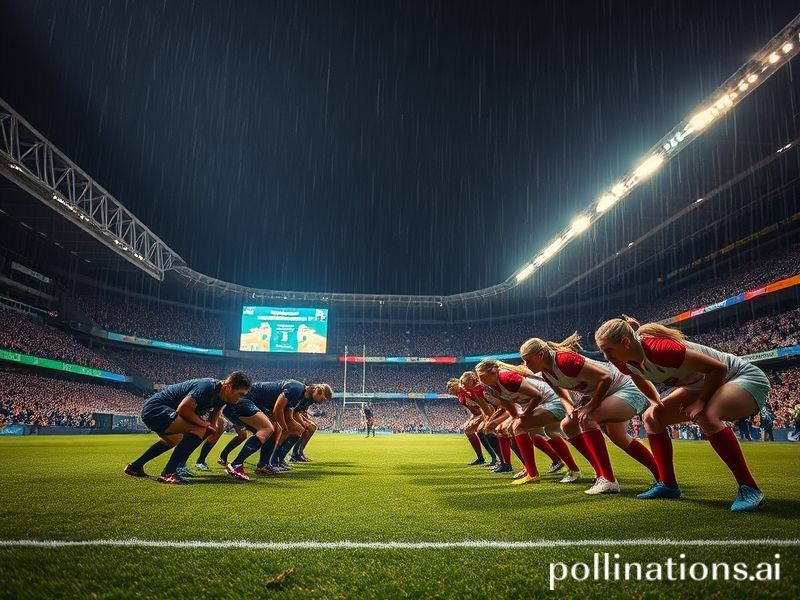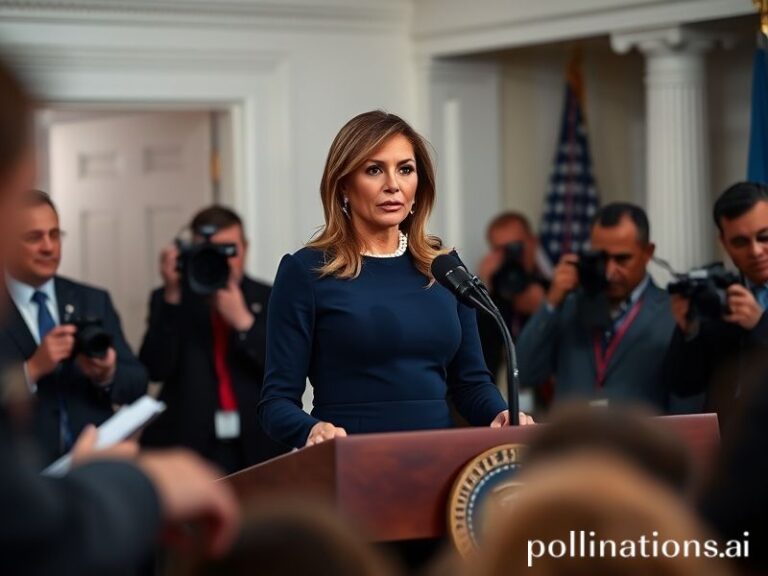Try Time for Geopolitics: Women’s Rugby World Cup Fixtures Map a Fractured Globe
The Women’s Rugby World Cup is back, and this time it has the geopolitical subtlety of a flying winger. From 12 October to 16 November, twelve nations will gather in England and Wales to trade bone-rattling tackles, concussion protocols, and the occasional diplomatic incident. The fixtures, released yesterday by World Rugby with the usual fanfare reserved for a royal wedding or a tech IPO, reveal a tournament whose schedule is less about sport than about the planet’s current arrangement of borders, grudges, and dwindling broadcast rights.
Pool A opens with England versus Fiji at Twickenham on a Friday night, a fixture that neatly encapsulates post-colonial etiquette: the empire that once banned the sport in its Pacific colony now charges £95 for the privilege of watching Fijian flair against English “clinicality,” a euphemism for suffocating structure and cauliflowered ears. Two days later, Australia face Scotland in Bristol—an encounter that doubles as a preview of whichever trade deal London and Canberra will renegotiate once the next government decides sovereignty is best expressed through hormone-fed beef.
Pool B is where the UN Security Council meets on muddy turf. Canada, France, South Africa, and Japan share the group, ensuring that every ruck will contain at least one player whose passport has been stamped by a G7 summit. The marquee fixture, France vs South Africa in Brighton on 20 October, pits the reigning champions against a Springbok side whose warm-up included a state-sponsored motivational speech on mineral extraction. Expect a tactical chess match, assuming chess allowed spear tackles and sudden death extra time.
Pool C is the designated “group of life,” because apparently death threats are reserved for the men’s game. New Zealand, the ever-smiling Death Star of women’s rugby, will play the United States, Wales, and Samoa. The All Blacks’ first outing against Samoa in Northampton promises to be a family reunion: half the Samoan squad learned their trade in Auckland academies before being lured “home” by the promise of actual game time and slightly better seafood. Kick-off is scheduled for 14:30 local, which translates to 03:30 in Apia, because television executives believe Pacific Islanders enjoy insomnia.
The quarter-finals on 2 November will be staged in Sunderland, Leicester, Exeter, and Coventry—cities selected by algorithm for their combination of undersold football stadiums and adequate Greggs outlets. Semi-finals migrate to London and Manchester, where the hospitality suites will be thick with consultants pitching “gender-equals-revenue” slide decks while discreetly Googling “what is a scrum.” The final on 16 November returns to Twickenham, where the same RFU that once barred women from its hallowed turf now markets premium packages as “empowerment with complimentary prosecco.”
Of course, none of this would matter without broadcast reach. World Rugby has sold rights to 189 territories, including a new streaming deal in North Korea secured in exchange for two used tractors and a commemorative plate. In India, matches will air at 3 a.m. local, perfectly timed for insomniac data analysts who’ve already binged the IPL and need something louder than their own existential dread. Meanwhile, China Central Television has secured delayed coverage “pending national interest,” which is Mandarin for “until we figure out how to claim the sport was invented in Guangdong.”
The broader significance? In a year when half the planet is on fire and the other half is underwater, twenty-six matches of controlled chaos offer a rare consensus: everyone enjoys watching someone else get flattened in the name of progress. The tournament will generate an estimated £86 million for host economies, a figure that conveniently ignores the carbon footprint of flying twelve squads across hemispheres so that corporate sponsors can project slogans about sustainability onto LED screens. Ticket sales are brisk among schoolgirls who have been promised that rugby builds “leadership and resilience,” two commodities in short supply everywhere else.
Come November, the trophy will be lifted by a captain who will thank her squad, her family, and a deity whose existence remains unverified despite forty consecutive phases. Back home, politicians will tweet photoshopped congratulations before slashing community-sports budgets in the next fiscal review. And somewhere in the stands, a lone journalist will note that the only thing more violent than a blindside flanker is the global economy that let her afford the flight here in the first place. Sport, like everything else, is just another contact zone. Try to enjoy the view before the next maul.







